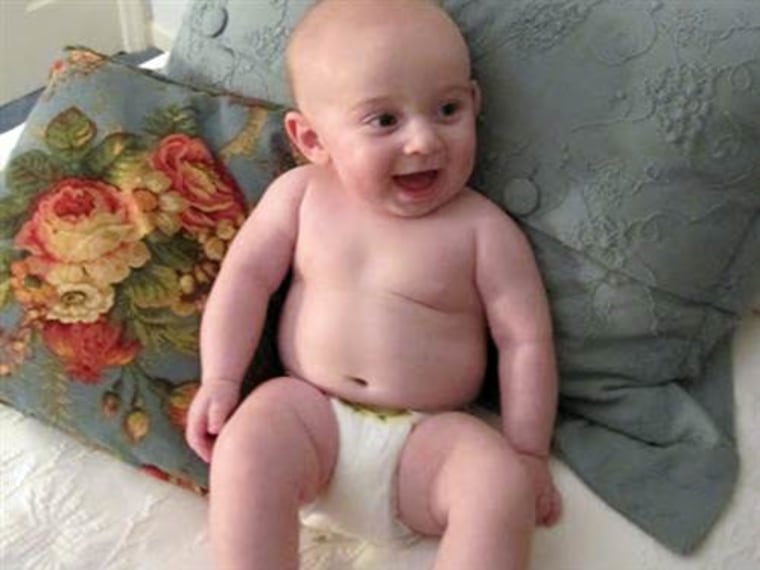For the first six months of my son’s life, everyone commented on his weight. Strangers felt perfectly comfortable saying, “Look at those thunder thighs,” and “You’ve got yourself a little Sumo wrestler!” Meanwhile, I wasn’t the least bit fazed by the scale at check-ups or how many ounces my little guy consumed. He was a baby after all, and babies are supposed to have those amazing, chunky arm rolls— aren’t they? It never occurred to me that a baby could be considered overweight, or that I had to consider my son’s risk for childhood obesity before his first birthday.

It turns out, though, that having a baby that’s "too fat" is up for debate. And new research suggests that newborn feeding practices may have more to do with toddler obesity than experts previously thought.
“We know that we have children with clinical obesity at age two, which makes you more likely to be overweight as a teen and into adulthood,” says Ben Gibbs, a professor of sociology at Brigham Young University. Gibbs co-authored a recent study in the journal "Pediatric Obesity" that found clinical obesity at 24 months was strongly correlated to formula feeding in infancy.
The team studied 8,000 mothers with nine-month-old babies, asking them whether they predominantly breastfed or formula-fed or did both, and then evaluated the child’s weight at age 2. Babies put to bed with a bottle were 30 percent more likely to be obese at age 2. Those fed solid food before four months were 40 percent more likely to become obese.
Gibbs says his research suggests that babies who are mostly bottle-fed don’t always learn how to regulate their appetites the same way as breastfed babies, and that parents may tend to overfeed when they’re looking at a bottle of milk and measuring a baby’s serving in ounces (something a mom doesn’t do when she breastfeeds).
“The takeaway here,” Gibbs says, “is that the habits we adopt early on for our babies matter later in life.” The study doesn’t mean your baby will be overweight if he is bottle-fed at night, he assures new parents. But while obesity has a lot to do with genetics and biology, Gibbs says his research does tell parents to be mindful of a baby’s feeding practices in the first few months of life.
RELATED: Grieving mother shares her baby's last video, hoping it will save lives
Labeling a baby as "fat" has been the topic of the parenting blogosphere recently, with some mothers – particularly those with daughters – wondering when exactly they are supposed to start worrying about their child’s body mass index.

Jessica Grose recounts her uncertainty when a woman told her not to worry, that her five-month-old would surely grow out of her chunky stage. The comment prompted Grose to wonder whether she could be a good role model for her daughter when it comes to issues of body image and social expectations for young girls, she wrote in the New York Times’ Motherlode blog.
“I’m not at all worried about my daughter’s “growing out” of anything," she wrote. "I know my acquaintance didn’t mean it as an insult. She probably just assumed I was concerned about my daughter’s size because I used the word chubby and fat phobia is our default cultural setting.”
At the same time, Grose felt compelled to defend her baby’s weight, saying her daughter was big at birth, and has remained on the same “robust” growth trajectory.
Jeanne Sager of Callicoon Center, NY, mom to 7-year-old Jillian, can relate to the internal pressures of hearing someone describe your baby as chunky. Sager, a recovering bulimic, who wrote about her worries on The Stir.com, says that while she loves “fat babies,” she admits it was a constant struggle to appreciate Jillian’s early, roly-poly stage. “When people would make comments on her chubby little cheeks, I would smile,” explains Sager, “but inside my stomach was in knots.” People don’t realize the buttons they’re pushing for parents, she says.

RELATED: Got morning sickness? New research shows it might be better for your baby
The Centers for Disease Control and Prevention and the American Academy of Pediatrics both recommend the use of body mass index (BMI) to screen for overweight and obesity in children beginning at age 2. But, on its website, the CDC warns physicians that the BMI chart alone is “not a diagnostic tool,” and that while a child may have a high BMI for his or her age and sex, a health care provider needs to perform a full medical assessment— evaluation of diet, physical activity, family history and health screening— before a child can be diagnosed with a weight problem.
For children under 2, the CDC refers health care providers to the World Health Organization’s growth charts, which provide length and weight percentile guidelines for both males and females age zero to 24 months. In fact, using the CDC growth charts to evaluate healthy size, a long-term 2011 study of 7,500 infants born in 2001 found that 32 percent of U.S. babies were already overweight by nine months.
But Dr. Cynthia Mann, a pediatrician in Hamden, Conn., says that in more than 30 years of practice, she can count on one hand the number of babies she’s seen who she thought were overweight. “Babies are born with extra fat which helps keep them warm,” says Mann. “As babies grow, some are in the higher [weight] percentiles. As a good rule of thumb, if the weight percentile parallels the length percentile, this is normal growth.”
RELATED: How one mom's extraordinary love transforms the short lives of hospice babies
When parents ask about overfeeding their newborns, she tells them, “The only way to overfeed a baby is to use feeding as the only solution to comfort him or her.” While some babies will need a little help unwinding, providing a bottle every time they’re fussy or having trouble sleeping isn’t the answer— and could potentially lead to unnecessary calories over the long term.
However, Mann cautions that restricting a baby’s caloric intake is almost always “a terrible idea,” and that parents should always consult their child’s pediatrician before ever putting a baby on any kind of diet.